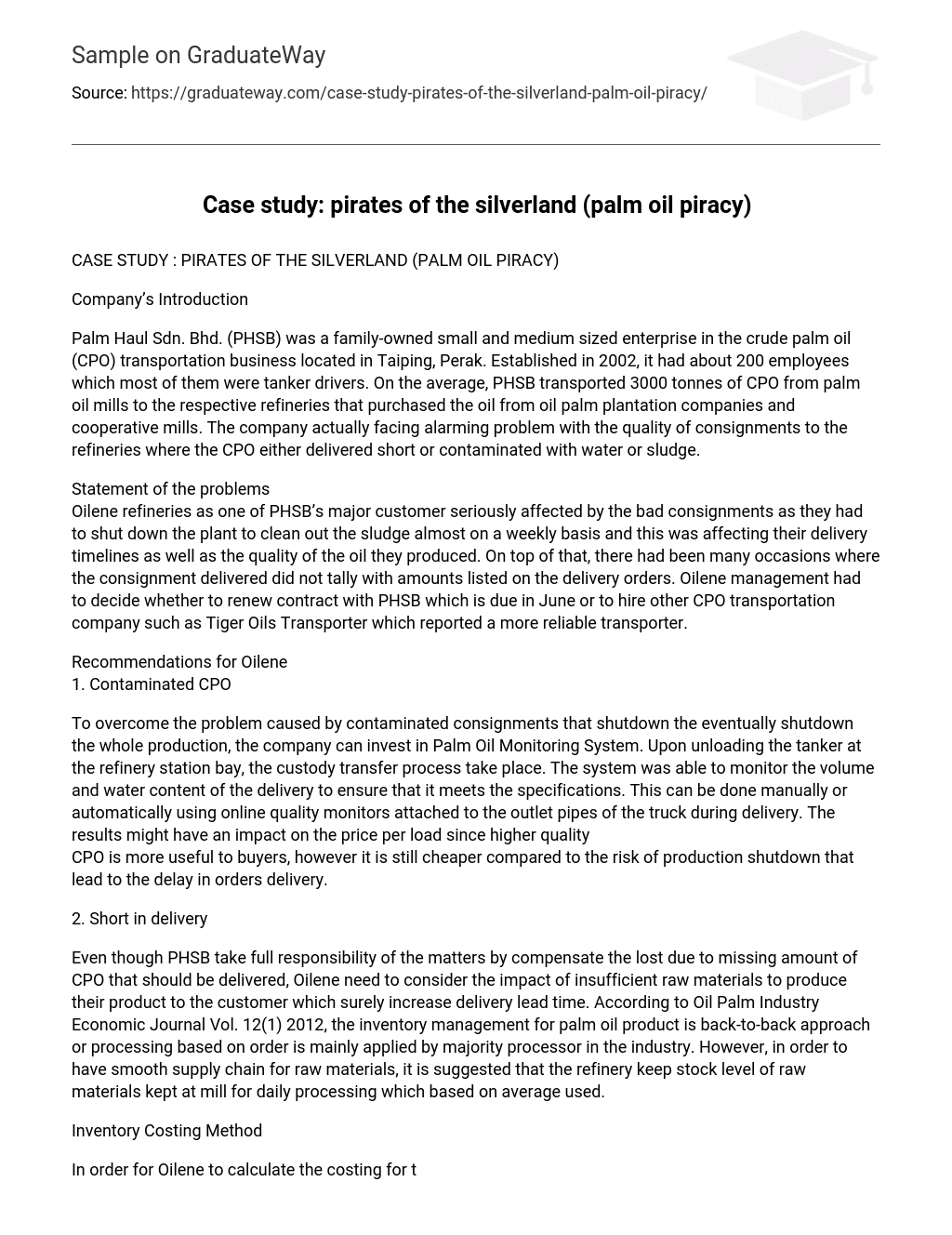Company’s Introduction
Palm Haul Sdn. Bhd. (PHSB) was a family-owned small and medium sized enterprise in the crude palm oil (CPO) transportation business located in Taiping, Perak. Established in 2002, it had approximately 200 employees, the majority of whom were tanker drivers. On average, PHSB transported 3000 tonnes of CPO from palm oil mills to the respective refineries that purchased the oil from oil palm plantation companies and cooperative mills. However, the company was currently facing a concerning issue with the quality of the consignments delivered to the refineries. The CPO was either delivered in insufficient quantities or contaminated with water or sludge.
Statement of the problems
Oilene refineries, one of PHSB’s main clients, has been greatly affected by the poor quality of shipments. The refinery has had to regularly halt operations to remove sludge, resulting in significant delivery delays and a decrease in oil quality. Moreover, there have been multiple cases where delivered shipments did not match the quantities specified on the delivery orders. Oilene management now must decide whether to extend their contract with PHSB (which ends in June) or engage Tiger Oils Transporter, a more dependable CPO transportation company.
Recommendations for Oilene
Contaminated CPO
Investing in the Palm Oil Monitoring System can help the company address issues caused by contaminated consignments that could potentially lead to a halt in production. The custody transfer process takes place when the tanker is unloaded at the refinery station bay. This system has the capacity to monitor both volume and water content of deliveries, ensuring they meet required specifications. Monitoring can be done manually or automatically using online quality monitors connected to the outlet pipes of trucks during delivery. The results of this monitoring may impact the price per load, as higher quality CPO is more valuable to buyers. Nonetheless, it remains a cost-effective solution compared to the risk of production shutdown and subsequent delays in order delivery.
Short in delivery
Despite PHSB taking full responsibility for compensating the lost amount of CPO that should have been delivered, Oilene must consider the impact of inadequate raw materials on customer product production, which will inevitably increase delivery lead time. According to a study in the Oil Palm Industry Economic Journal Vol. 12(1) 2012, the majority of processors in the industry adopt a back-to-back approach or process orders as they come. However, to ensure a smooth supply chain for raw materials, it is recommended that the refinery maintain a stock level of raw materials at the mill for daily processing, based on average usage.
Inventory Costing Method
In order for Oilene to calculate the costing for the CPO inventory, the inventory accounts involved are Materials Inventory when the CPO hasn’t gone through manufacturing process, Work in Process Inventory during the manufacturing process, and Finished Goods Inventory when the goods have been manufactured but have not yet been shipped to customers. The average cost method will be used to cost the units of cost of goods sold and ending inventory at the average cost.
Conclusion
The suggestions mentioned aim to help Oilene prevent losses caused by consignment deliveries. These measures enable Oilene to maintain control over the quality and quantity of their raw materials and, most importantly, ensure timely delivery of customer orders.
Regarding the PHSB contract renewal, Oilene management has the option to extend the contract with additional terms. This is due to PHSB’s strong commitment in enhancing their delivery services’ quality. For instance, there may be an exit clause allowing termination of the contract if contamination occurs more than three times in a month. This is supported by their Palm Oil Monitoring System.
References
- Ahmad Borhan and A Nordin, (n.d.), A Study on Inventory Management of Malaysian Palm Oil Products. Retreived from http://palmoilis.mpob.gov.my/publications/OPIEJ/opiejv12n1-Borhan.pdf
- Oil Palm Process. Retrieved from http://www.malaysianpalmoil.com/oil-palm-process.html





